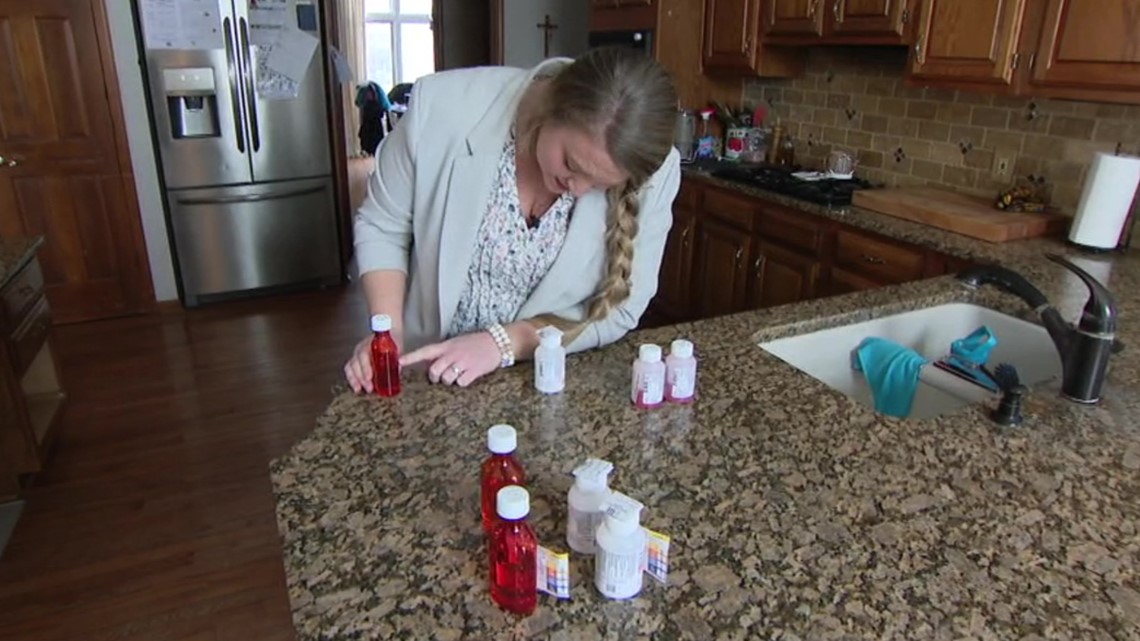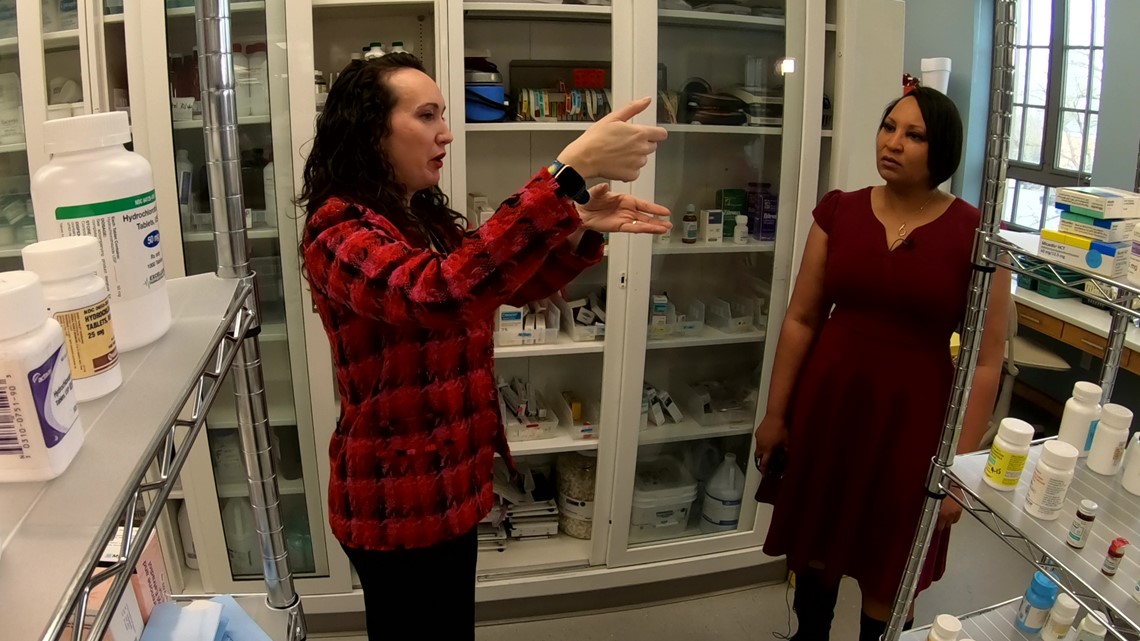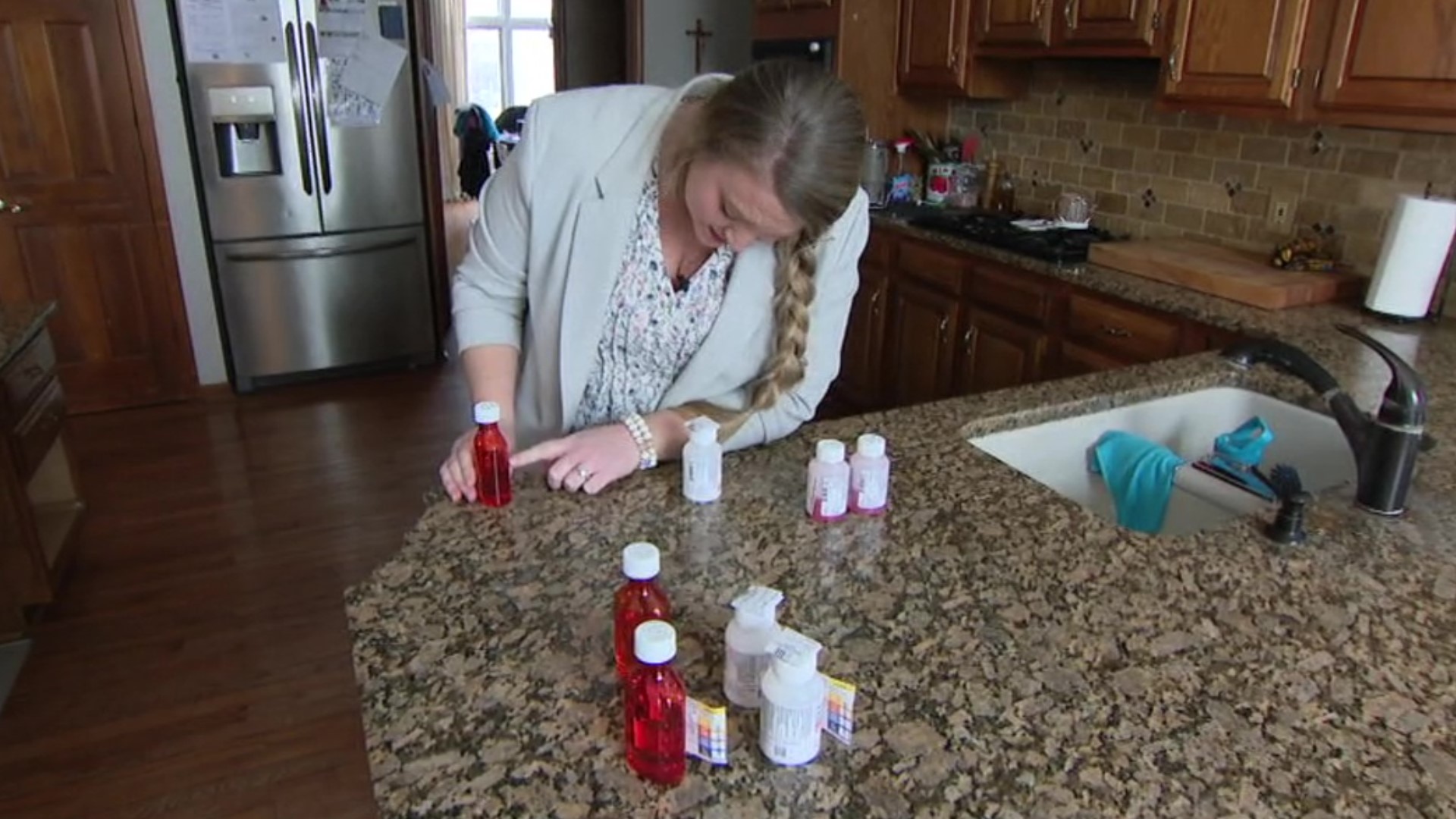INDIANAPOLIS — Three-year-old John Casolaro's parents had no idea what was wrong when he was sick this past December. Then, his father noticed something unusual while mixing the boy's liquid medication. The pharmacy provides both the powdered drug and the water the Casolaros combine.
"I raised the flag and said, 'I don't think we have enough water for this dose,'" Matt Casolaro said.
Now the family believes the boy was experiencing side effects from a medication error. An error his parents say the pharmacy did not warn them about.
John's mom took the medication back to the pharmacy.
"Before I even got very far, even, like, talking with (the pharmacist), she kind of interrupted me," Elle Casolaro said. "And said, 'Oh, yeah. We've had trouble with our water filling machine … I was kind of like dumbfounded … Here we had made this discovery in our kitchen, and they already knew."


Elle told the pharmacist they had already given their little boy one bottle of the medication. She says she also told the pharmacist, "'And you know, if I'm understanding correctly, this means that we've overdosed him because the powder was too concentrated.'"
Casolaro said the pharmacist then listed possible side effects including diarrhea which the family said John experienced.
13 Investigates learned community pharmacies, like the CVS the Casolaros used, are not required to tell patients if they make a medication error. There also is no state or federal agency tasked with tracking those errors.
Experts tell 13 Investigates many pharmacies do track errors internally.
We sent a list of questions to CVS and some of the largest retail pharmacies in central Indiana to learn more about their error-reporting policies.
A CVS spokesperson replied with a statement that said, in part, "When we learn of a prescription error, the first priority of our pharmacy teams is caring for the patient, taking steps to correct the error, working with the patient and the prescriber. In the rare event of a dispensing error, we use the learnings from that event in our continuous quality improvement efforts."
While health care experts say reporting medication errors to patients is a best practice, it is not required by law. There also is not an Indiana or federal law to require pharmacies to report errors to any local or national board or agency. That means the total number of these mistakes state or nationwide is unknown.
"I get asked a lot, 'What's the frequency at which these errors occur in community pharmacies?' and it's hard to tell," said pharmacist Veronica Vernon. "It could be 2%. It could be 20%, it could be 80%. It's really hard to tell, because if we're not getting every error reported in aggregate and looking at what that rate is, we don't really know."
Vernon is the vice chair of pharmacy practice at Butler University and is a past president of the Indiana Pharmacy Association.


Vernon told 13 Investigates she believes the profession needs to do a better job reporting medication errors, but stops short of calling for mandated reporting.
Rita Jew supports mandated reporting to patients. She is the president of the Institute for Safe Medication Practices, a nonprofit that reviews voluntary error reports from consumers, pharmacy workers, doctors, nurses, and other health care professionals to help create best practices.
In 2023, California became the first state to pass a law requiring community pharmacies report all prescription errors to the state. Jew said other states like Indiana should follow suit. Right now, Indiana requires hospital pharmacies to report some medication errors, but that rule does not apply to other pharmacies.
"We know (errors are) happening," Jew said. "And (when) we don't report them we can never learn from them, and we can never put systems in place to prevent them from happening."
Jew and Vernon both support implementing what the industry calls a just culture approach that promotes error reporting. The focus is on aggregating data and then using that information to make changes to the system but not necessarily to punish healthcare workers who make a mistake.
"We look at the circumstances," Jew said. "If there is reckless behavior, we definitely want to hold people accountable and punish those behaviors. But if it is a human error, then we don't punish them."
The goal, they say, is to build a culture that better supports pharmacists and pharmacy workers, many of whom report they're overworked and understaffed.


The Casolaros told 13 Investigates pharmacy workers mentioned during past visits their location was understaffed. With that knowledge, the family decided to file a complaint with the Indiana Attorney General's Office so what happened to their son would be looked into.
"The report itself is written like it's us versus (the pharmacist) personally, and I really disliked that," Elle said. "Because I think it's a CVS issue, not this particular pharmacist."
The Indiana Attorney General's Office reports it has received 366 complaints against pharmacy licenses since 2021 and 66 of those complaints alleged medication or dosage errors. The office took five to the Pharmacy Board for possible action against the pharmacy or pharmacist.
One case resulted in CVS having to pay a $1,000 civil penalty after a pharmacy mistakenly increased the dosage of a patient's heart medication. Records show the pharmacy notified the patient four weeks after dispensing the medication. Filings with the Pharmacy Board state the patient experienced intense pain, temporary loss of movement and was hospitalized for several days.
The Casolaros say John's experience with a dosage error wasn't as extreme. Still, they report the boy dealt with side effects – including an upset stomach and diarrhea.
13 Investigates reached out to CVS about the Casolaros' issue. The company sent the following statement:
"The health and wellbeing of our patients is our number one priority, and we have comprehensive policies and procedures in place to support prescription safety. The water dispenser at our pharmacy on Spring Mill Station Drive was inspected as scheduled on November 28, two days before the patients' prescriptions were picked up, and found to be functioning properly. It was recalibrated on December 11 to confirm accuracy. Out of an abundance of caution, on December 13 we re-dispensed penicillin prescriptions to the patients, verifying their medications had the correct amount of water."
The family said John and one of his older sisters must take penicillin daily until they turn 21. It's a preventative to make sure the children do not get strep throat. The last time the siblings got the infection they developed rheumatic fever, a rare but potentially deadly disease. The family said John's sister did not experience side effects because she was still getting medicine from a bottle filled at an earlier time.


Another reason the family filed a complaint with the state is because they were worried other people may have a misdosed medication and not realize it. They pointed out a lot of the people who take liquid medications are children or the elderly, people like John who may not be able to speak up for themselves. The toddler has a brain disorder that limits his verbal skills. "There is no way for him to tell us, like, 'Hey, my stomach really hurts,'" his mom said. "Or 'Hey, this medicine really doesn't taste the same.'"
The family tells 13 Investigates it believes pharmacies should immediately tell patients if they know there's a problem or potential problem, suggesting they should send out notices like a recall.
13 Investigates reached out to some of the largest retail pharmacies serving central Indiana – Amazon, CVS, Kroger, Meijer, and Walgreens - to ask about their reporting policies, including if they require pharmacists to report mistakes to patients and their thoughts on mandated reporting.
As of publication, only CVS and Amazon responded to our request. Neither company said it requires pharmacists to report all errors to patients.
"Amazon Pharmacy is committed to the safety and wellbeing of our customers. We abide by federal and state safety recommendations, and proactively invest and invent in novel approaches to improve safety in combination with strong policies and procedures in place to prevent medication errors. If a pharmacist is concerned about an error with a medication dispensed by Amazon Pharmacy, we contact the patient or clinician and report the issue to a patient safety organization," an Amazon Pharmacy spokesperson said.


The company went on to say it encourages patients to reach out if they believe there is a problem with a medication and even contact the U.S. Food and Drug Administration. MedWatch is the FDA's adverse event reporting program that collects reports from health professionals, patients, and consumers. People can report several types of issues involving prescriptions and over-the-counter medicines, medical devices, cosmetics, and other products.
CVS says it has taken steps to minimize human error by automating 90% of its data entry for e-prescriptions. CVS also reports it uses advanced technology to support quality assurance checks and transitioned to a numeric system for prescription pick-up.
The company statement went on to say, "When we learn of a prescription error, the first priority of our pharmacy teams is caring for the patient, taking steps to correct the error, working with the patient and the prescriber. In the rare event of a dispensing error, we use the learnings from that event in our continuous quality improvement efforts."
CVS, like several community pharmacies, also reports errors to a patient safety organization or PSO. The federal PSO program was established as a result of the Patient Safety and Quality Improvement Act of 2005. Participation is voluntary and the Information collected is often kept internally and not shared with the public.
After their experience, the Casolaros considered switching pharmacies, but stayed with CVS because of their insurance. Leaving the chain would have resulted in them paying for their children's prescription out-of-pocket.
"It was an astronomical cost that we weren't willing and able to take on, given that we have to do this until they're 21 years old," Elle said.
The Casolaros now go to a different CVS location, where they say pharmacy workers have taken steps to better label the children's medication.
The family is also more vigilant now when reviewing the children's prescription. The Institute for Safe Medication Practices encourages all patients to do the same.
"Trust your gut," Jew said. "If your gut says something is not right, you should speak up and ask about that."
The nonprofit has a consumer safety website where they provide tips for consumers. The institute suggests patients talk to the pharmacist about their medication and double check prescriptions. If it's a prescription you've had before, check to make sure the medication is the right color.

